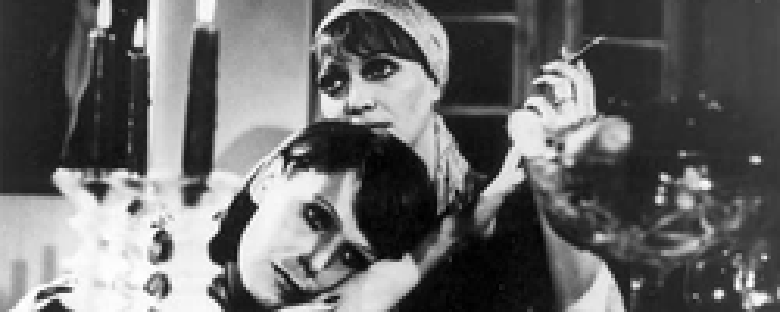Reviews
Chinesisches Roulette
Rainer Werner Fassbinder
Germany, 1976
Credits
Review by Matt Bailey
Posted on 10 July 2004
Source Wellspring DVD
Chinese roulette is a party game for two groups in which the first group thinks of a person in the second group and the second group asks a series of questions to determine about whom they are thinking. It’s like twenty questions. Like many party games, it can be lighthearted fun or it can be cruel. Guess which approach Fassbinder takes.
A man and his wife are taking separate business trips over the weekend. Unbeknownst to his wife, the man has actually arranged to take his mistress to the couple’s country home. Unbeknownst to her husband, the woman has actually arranged to take her lover (and her husband’s assistant) to the couple’s country home. The couple’s hateful crippled daughter, who knows all of their secrets, has arranged for them a very interesting weekend.
The couple and their respective paramours arrive at the manor, overseen by a forbidding housekeeper and her peculiar son, surprised and not a little ashamed of themselves. The couple deals with the situation like the bored bourgeois sophisticates that they are — they laugh it off and agree to enjoy the weekend à quatre. These good intentions are derailed when their daughter arrives with her mute governess in tow and announces that she’d like to play a little game of Chinese roulette.
Fassbinder’s film, in a nod to the structure of some of his earliest films, takes a group of people, puts them in a volatile situation, and then invites the viewer to sit back and watch the fireworks. What is different in this film from those of a decade before, apart from the fact that the nastiness is orchestrated by a teenaged girl, is the level of narrative and stylistic sophistication at which Fassbinder works.
Whereas the earlier films, mostly shot by Dietrich Lohmann, often framed the groups or members of the group in static tableaux in order to highlight their solidarity and opposition to a lone outsider, this film (Fassbinder’s ultimate collaboration with Michael Ballhaus) uses an almost constantly moving camera and a remarkable succession of framing and fracturing devices within the camera frame to underscore the shifting alliances, individual isolation, and internal struggles of the characters.
The main set of the film, the dining room of the manor, is packed with doorways, mirrors, and strange Plexiglas racks that hold liquor and audio equipment. Fassbinder and Ballhaus use the doorways to bisect faces and bodies, the mirrors to double them, and the Plexiglas racks to both fragment and reflect them. For Fassbinder, who began making films with something close to a visual anti-aesthetic, it’s a thrilling revelation to see him work in such a highly symbolic, almost Bergmanesque, visual style. He made this film just as he was beginning to be recognized as a master director on a global scale and it almost seems as if he was meeting the challenge of those who thought he had run out of ideas and those who questioned his ability to narrate in images.
With this film, Fassbinder got the opportunity to work not only with members of his regular informal repertory company including Ulli Lommel, Volker Spengler, and Brigitte Mira, but also with one of his idols of the French New Wave, Anna Karina. Fassbinder being Fassbinder, he perversely upends her persona from Godard’s films and sucks all the vibrancy and vivacity out of her character, turning her into a somewhat sad woman who has contended herself to be the other woman. Margit Carstensen, another of Fassbinder’s usual gang (and the unsung female acting genius in his films who is consistently overlooked in favor of Hanna Schygulla), turns in another astonishing performance as the victim and cause of her daughter’s fury. Andrea Schober, as the villainous little Angela, is the best girl-you-love-to-hate since Patty McCormack.
Fassbinder intended the film to be an indictment of marriage and the cruelty inflicted on children when a marriage goes bad, but it’s also effective as an testimonial for the advantages of birth control. Chinese Roulette is one of those films where you hate every single one of the characters yet can’t tear yourself away from them until you find out how they end up.
We don’t do comments anymore, but you may contact us here or find us on Twitter or Facebook.



